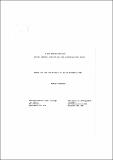| dc.description.abstract | The emerging ideology and practices of reversals conflict with normal
professionalism and normal bureaucracy. In India, change is impeded by
culture, bureaucratic conservatism and corruption. Fordist reflexes are
normal, in which standard solutions are imposed on diverse environments.
Fordist programmes often misfit local conditions, but are sustained by the
false positive feedback of a self-deceiving state.
Agricultural research and extension, canal irrigation and waterbed
management present cases both of inappropriate large-scale Fordism and of
new, though small-scale, approaches and opportunities for reversals. For
the future, decentralisation, open communications of rights, and
organisation of demand from the grassroots provide means to moderate
Fordism, reduce falsehood in Government administration, and support a new
style and mode of administration. For such change, personal reversals by
influential officials are crucial. | en_GB |

